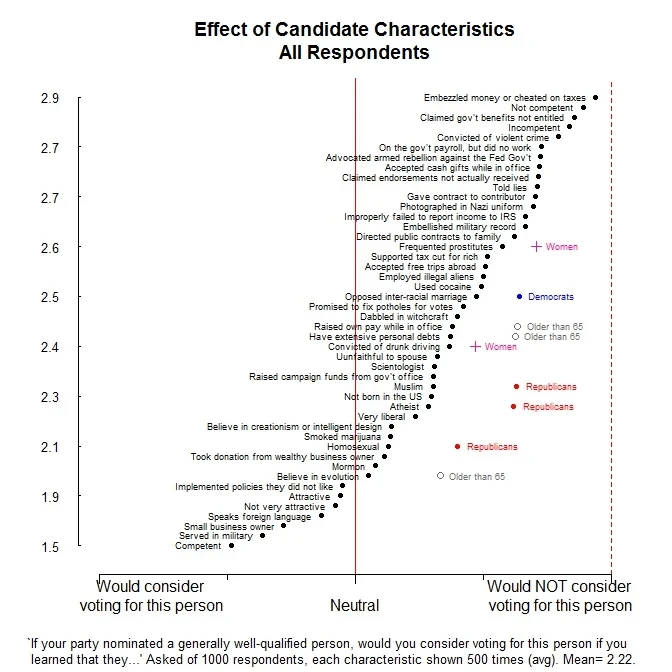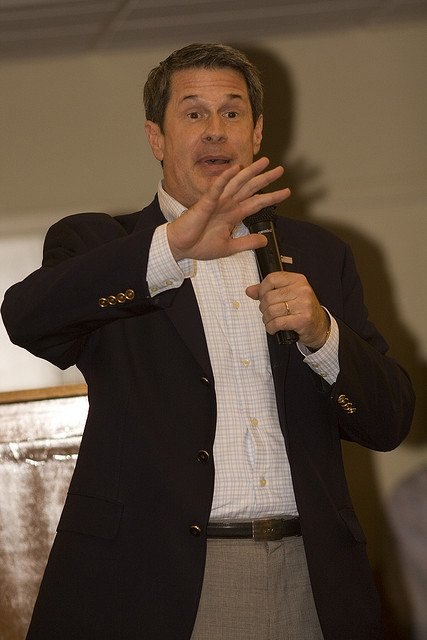The theater of campaign politics had a full stage this election. A slew of novice candidates brought advocates of armed rebellion against the Federal Government, anti-miscegenationists, a Nazi-uniform-wearing WWII reenactor, and even a witch. Well, she’s not really a witch…. She’s you.
Beyond the theatrics, it is unclear what voters actually think about these characteristics. Quite simply, we do not know if it is better to get caught wearing a Nazi uniform or snorting cocaine. Is it worse to be a witch or to lie about your military record? To be Mormon, Muslim, Atheist or Scientologist? (Preview: when it comes to religions, only “dabbling in witchcraft” is viewed worse than scientology. And Mormons are just fine.)
In making such an evaluation, the richness of a real election with real candidates is actually a poor environment to learn about voter preferences. Monday night quarterbacking (or, Wednesday morning campaign strategizing) too often embraces the fallacy of the single cause (or as Andrew Gelman calls it: “piss-poor monocausal social science”) and ignores how context affects evaluation. In short, it would be a Herculean claim to say that Christine O’Donnell lost because she had “dabbled in witchcraft”, or Meg Whitman lost because she had employed an undocumented housekeeper. Each candidate is a bundle of characteristics which are not easily separated. As one respondent commented: “I said no to witchcraft tinkering, yet I WOULD vote for Christine Odonnel...her other marks rank high in my opinion.” Similarly, voters are evaluating those characteristics through the lens of how they initially felt about that candidate. Democrats interpret O’Donnell’s “dabble” as evidence that she’s crazy, while for Republicans, it reminds them how the liberal media attacks the salt of the earth.
A recent YouGov survey asked 1000 respondents if they would be willing to vote for “a generally well-qualified person” nominated by their party if they learned that candidate had one of the following characteristics. These characteristics range from criminal actions to the candidates' faith, but consisted primarily of characteristics the public generally views negatively.
Some characteristics were “drawn from the headlines”:
- Charlie Rangel – Tax evasion, gifts, trips…
- Sharron Angle hinted at armed rebellion against the Federal Government
- Michelle Bachman told lies. Lots of lies. Then some more. And more and more.
- Rich Iott was photographed in a Nazi uniform (war reenactment)
- Mark Kirk, Rich Iott, and Hillary Clinton embellished their military records
- David Vitter, Eliot Spitzer, Barney Frank, Jerry Springer, Dick Morris were caught with prostitutes
- Meg Whitman, Lou Dobbs, Tim Geithner, Nancy Killefer, Caroline Kennedy, Linda Chavez, and Bernard Kerik employed undocumented immigrants
- Jim Russell opposed interracial marriage
- Christine O’Donnell dabbled in witchcraft
Although stories of witchcraft, or sex scandals may lead in the headlines, the dictates of voters are much more mundane: do a good job and don’t violate the public trust. These survey results indicate that embezzling money or cheating on their taxes is the worst thing a candidate can do; followed closely by lack of competence. Similarly, of the few traits expected to be positive, it is being competent that is most favored by Americans.
While there is little disagreement on these clearly positive or clearly negative traits, the disagreement in the middle can be quite illustrative. That Republicans view atheists and Muslims less favorably than others should not be too much of a surprise. It may be a surprise, however, when we look at this difference comparatively. The average Republican views being an atheist or Muslim candidate about how the typical American views a candidate who frequents prostitutes. Similarly, Republicans view a homosexual candidate like most Americans view a candiate who has been convicted of drunk driving.
This certainly does not mean that these characteristics determine an election, but this can provide some guidance to candidates: Mitt Romney may not need to worry about his faith, but Tom Cruise might.

(Note: the characteristics shown above are selections from the full survey, and the wording is truncated. All highlighted difference by Party Identification, gender and age are statistically significant at the .05 level.)









